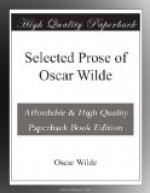But Life soon shattered the perfection of the form. Even in Shakespeare we can see the beginning of the end. It shows itself by the gradual breaking-up of the blank-verse in the later plays, by the predominance given to prose, and by the over-importance assigned to characterisation. The passages in Shakespeare—and they are many—where the language is uncouth, vulgar, exaggerated, fantastic, obscene even, are entirely due to Life calling for an echo of her own voice, and rejecting the intervention of beautiful style, through which alone should life be suffered to find expression. Shakespeare is not by any means a flawless artist. He is too fond of going directly to life, and borrowing life’s natural utterance. He forgets that when Art surrenders her imaginative medium she surrenders everything.—The Decay of Lying.
LIFE THE DISCIPLE
We have all seen in our own day in England how a certain curious and fascinating type of beauty, invented and emphasised by two imaginative painters, has so influenced Life that whenever one goes to a private view or to an artistic salon one sees, here the mystic eyes of Rossetti’s dream, the long ivory throat, the strange square-cut jaw, the loosened shadowy hair that he so ardently loved, there the sweet maidenhood of ‘The Golden Stair,’ the blossom-like mouth and weary loveliness of the ‘Laus Amoris,’ the passion-pale face of Andromeda, the thin hands and lithe beauty of the Vivian in ‘Merlin’s Dream.’ And it has always been so. A great artist invents a type, and Life tries to copy it, to reproduce it in a popular form, like an enterprising publisher. Neither Holbein nor Vandyck found in England what they have given us. They brought their types with them, and Life with her keen imitative faculty set herself to supply the master with models. The Greeks, with their quick artistic instinct, understood this, and set in the bride’s chamber the statue of Hermes or of Apollo, that she might bear children as lovely as the works of art that she looked at in her rapture or her pain. They knew that Life gains from art not merely spirituality, depth of thought and feeling, soul-turmoil or soul-peace, but that she can form herself on the very lines and colours of art, and can reproduce the dignity of Pheidias as well as the grace of Praxiteles. Hence came their objection to realism. They disliked it on purely social grounds. They felt that it inevitably makes people ugly, and they were perfectly right. We try to improve the conditions of the race by means of good air, free sunlight, wholesome water, and hideous bare buildings for the better housing of the lower orders. But these things merely produce health, they do not produce beauty. For this, Art is required, and the true disciples of the great artist are not his studio-imitators, but those who become like his works of art, be they plastic as in Greek days, or pictorial as in modern times; in a word, Life is Art’s best, Art’s only pupil.—The Decay of Lying.




